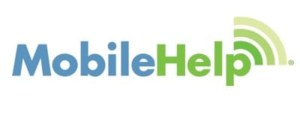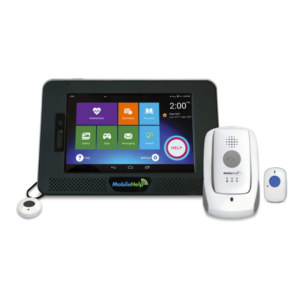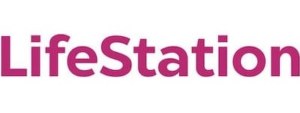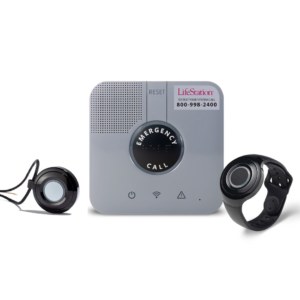MobileHelp vs. LifeStation: What’s Best for Your Loved One?
AgingInPlace.org keeps our resources free by working as an affiliate partner with some companies mentioned on our site. These partnerships or the commission we may earn do not affect our opinions or evaluations of the products we mention. Our reviews are solely based on our research methodology and from input from our AgingInPlace.org Advisory Board. Learn more about our ad policies.
MobileHelp vs. LifeStation: What’s Bes...
Products carousel
Older adults prefer to live independently in their homes as long as possible and often shy away from asking their family for help, according to a study published in Cambridge University’s Aging and Society. Medical alert systems enable seniors to age in their homes longer and more independently, while also providing peace of mind to their loved ones.
“These systems are crucial for timely intervention,” said Rizza Mira, MD and nutrition advocate. “For example, in the event of a stroke, a prompt medical alert causes emergency services to be activated at the right time.”
There are more than three dozen personal emergency response systems on the market, which can make it difficult to choose which is the best medical alert system for your loved one. The experts at AgingInPlace.org looked at two common medical alert system brands: MobileHelp vs. LifeStation. Here’s who we think would benefit most from each brand.
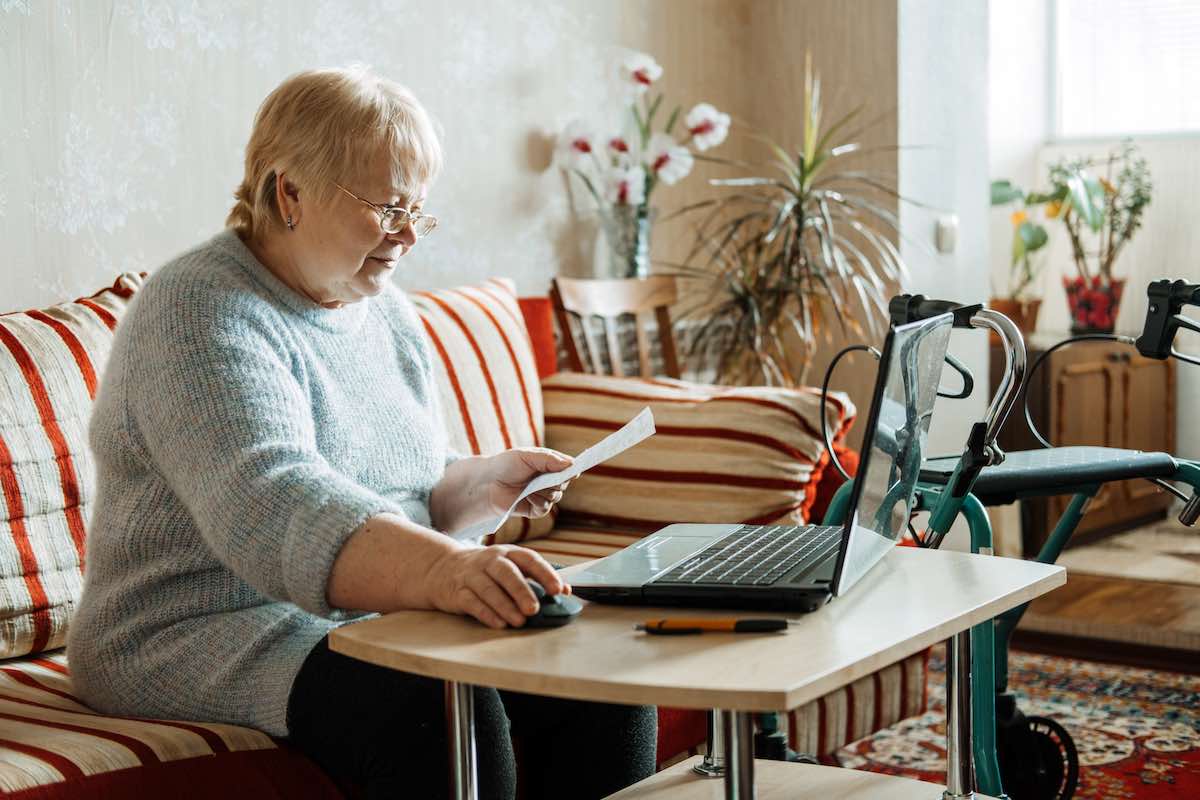
Key Takeaways
- MobileHelp has several different devices and packages, which can be overwhelming. LifeStation offers three devices.
- MobileHelp’s Mobile Duo offers medical alert services for two people at a more affordable price than two separate systems.
- LifeStation owns and operates its own monitoring center. MobileHelp outsources its monitoring service.
Overview for MobileHelp vs. LifeStation
When comparing MobileHelp vs. LifeStation, there are many similarities. Both are reputable medical alert system companies with 24/7 monitoring, competitive prices, no long-term contracts, a 30-day trial, and fall detection add-ons. Both also offer at-home and mobile devices. Read on to see how these two medical alert systems stack up against each other.
MobileHelp vs. LifeStation Comparison
| MOBILEHELP | LIFESTATION | |
|---|---|---|
| Monitoring | 24/7 | 24/7 |
| Products Available | In-home landline In-home cellular In-home cellular tablet On-the-go help buttons | In-home cellular On-the-go help button Smartphone |
| Monthly Cost | $24.95-$64.95 | $32.95-$37.85 |
| Equipment Cost | $0 | $0 |
| Activation/Enrollment/Processing Fee | $0-$99.95 | $59.95 |
| Installation Fee | $0 | $0 |
| Contract | No long-term contracts. Billed monthly, quarterly, semiannually, or annually. | No long-term contracts. Billed monthly, quarterly, or annually. |
| Range (at-home) | Classic: 1,400 feet Wired: 1,300 feet Duo: 600 feet Touch Classic: 150-300 feet | 600 feet |
| Battery Life (at-home base station | 24- to 30-hour backup battery | 32-hour backup battery |
| Battery Life (mobile device) | 24 hours | 5 days |
| Fall Detection Option | Yes, for an additional $10 per month on most devices | At-home—$8 Sidekick—$10 (not available with Sidekick Smart) |
| Risk-Free Trial | Yes | Yes |
| Connection Type | Landline, cellular, and GPS (AT&T network) | Cellular, and GPS (AT&T network) |
| Risk-Free Trial | 30 days | 30 days |
| Water Resistant | Pendant, wall help button | Pendant |
| GPS Tracking Option | Yes | Yes |
| Two-Way Voice Communication Available | Yes | Yes |
| Mobile App | Yes | Only via Alexa app |
| Optional Monthly Add-Ons | Fall protection, extra pendants, wall-mounted help buttons, protection plan, MDLive | Fall protection, extra wall-mounted help buttons |
| Special Features | MDLive connects users to a telehealth platform where they can connect with medical professionals via phone, computer, or smartphone. Prescription refills for common meds | Works with Uber Health to get users to key appointments on time. As part of this arrangement, LifeStation specialists book rides both directions whenever needed. Every system is remotely tested each week. |
| Monitoring | MOBILEHELP | 24/7 | LIFESTATION | 24/7 |
|---|
| Products Available | MOBILEHELP | In-home landline In-home cellular In-home cellular tablet On-the-go help buttons | LIFESTATION | In-home cellular On-the-go help button Smartphone |
|---|
| Monthly Cost | MOBILEHELP | $24.95-$64.95 | LIFESTATION | $32.95-$37.85 |
|---|
| Equipment Cost | MOBILEHELP | $0 | LIFESTATION | $0 |
|---|
| Activation/Enrollment/Processing Fee | MOBILEHELP | $0-$99.95 | LIFESTATION | $59.95 |
|---|
| Installation Fee | MOBILEHELP | $0 | LIFESTATION | $0 |
|---|
| Contract | MOBILEHELP | No long-term contracts. Billed monthly, quarterly, semiannually, or annually. | LIFESTATION | No long-term contracts. Billed monthly, quarterly, or annually. |
|---|
| Range (at-home) | MOBILEHELP | Classic: 1,400 feet Wired: 1,300 feet Duo: 600 feet Touch Classic: 150-300 feet | LIFESTATION | 600 feet |
|---|
| Battery Life (at-home base station | MOBILEHELP | 24- to 30-hour backup battery | LIFESTATION | 32-hour backup battery |
|---|
| Battery Life (mobile device) | MOBILEHELP | 24 hours | LIFESTATION | 5 days |
|---|
| Fall Detection Option | MOBILEHELP | Yes, for an additional $10 per month on most devices | LIFESTATION | At-home—$8 Sidekick—$10 (not available with Sidekick Smart) |
|---|
| Risk-Free Trial | MOBILEHELP | Yes | LIFESTATION | Yes |
|---|
| Connection Type | MOBILEHELP | Landline, cellular, and GPS (AT&T network) | LIFESTATION | Cellular, and GPS (AT&T network) |
|---|
| Risk-Free Trial | MOBILEHELP | 30 days | LIFESTATION | 30 days |
|---|
| Water Resistant | MOBILEHELP | Pendant, wall help button | LIFESTATION | Pendant |
|---|
| GPS Tracking Option | MOBILEHELP | Yes | LIFESTATION | Yes |
|---|
| Two-Way Voice Communication Available | MOBILEHELP | Yes | LIFESTATION | Yes |
|---|
| Mobile App | MOBILEHELP | Yes | LIFESTATION | Only via Alexa app |
|---|
| Optional Monthly Add-Ons | MOBILEHELP | Fall protection, extra pendants, wall-mounted help buttons, protection plan, MDLive | LIFESTATION | Fall protection, extra wall-mounted help buttons |
|---|
| Special Features | MOBILEHELP | MDLive connects users to a telehealth platform where they can connect with medical professionals via phone, computer, or smartphone. Prescription refills for common meds | LIFESTATION | Works with Uber Health to get users to key appointments on time. As part of this arrangement, LifeStation specialists book rides both directions whenever needed. Every system is remotely tested each week. |
|---|
MobileHelp Overview
MobileHelp is a leader in medical alert systems with more than 300,000 customers. The company offers a variety of devices and even more accessories to ensure your loved one is protected. Beyond the usual landline and cellular at-home products, MobileHelp also offers a tablet-based system called Touch Classic that features a scrolling picture library, games, and activity tracker options.
MobileHelp also offers two mobile devices, the Solo and Micro, the latter being the smallest and lightest version, weighing in at just 52 grams. The company also offers two complete coverage packages, which include at-home units plus mobile devices, in its Duo and Duo Touch options. A third package, Mobile Duo, is a more affordable two-for-one version of the Duo that provides coverage for two people living in the same home. MobileHelp also once offered a smartwatch medical alert system, but recently discontinued that option.
One standout option with MobileHelp is its telehealth add-on, which enables users to connect with a doctor via phone, computer, or smartphone.
For more information, check out our full MobileHelp Review.
Best For:
- Couples or roommates who both require medical alert monitoring
- Those who prefer a telehealth option
Pros
-
Telemed platform available
-
Several at-home and mobile systems to choose from, including high-tech options
-
The two-for-one device options offer a more affordable plan for spouses or roommates.
Cons
-
Monitoring is outsourced
-
Fall detection not available on all devices
| MobileHelp System | Type | Monthly (does not include promotional discounts) | Additional Fees (promotional discounts may apply) | Available Accessories (additional fees apply) |
|---|---|---|---|---|
| Classic | In-home, cellular, 1,400-foot range with waterproof pendant or wrist help button | $34.95 | $49.95 one-time processing fee | Automatic fall detection Protection plan Lockbox Extra wearable buttons Waterproof wall button Telehealth platform |
| Wired-Home | In-home, landline, 600-foot range with waterproof pendant or wrist help button | $54.95 | $99.95 one-time processing fee | Protection plan Telehealth platform |
| Touch Classic | In-home tablet, cellular, range of 150 to 300 feet, waterproof pendant or wrist help button | $54.95 | $99.95 one-time processing fee | Automatic fall detection Protection plan Lockbox Extra wearable buttons Waterproof wall button Telehealth platform Scrolling picture gallery Games Activity tracking Medication reminders |
| Solo | On-the-go, cellular, with waterproof pendant or wrist button | $37.95 | $0 | Automatic fall detection Protection plan Extra wearable buttons Waterproof wall button Telehealth platform GPS tracking |
| Micro | On-the-go, cellular, waterproof pendant or wrist button | $33.95 | $0 | Automatic fall detection Protection plan Telehealth platform GPS tracking |
| Duo | At-home and on-the-go devices, waterproof pendant or wrist button | $41.94 | $0 | Automatic fall detection Protection plan Extra wearable buttons Waterproof wall button Telehealth platform GPS tracking |
| Mobile Duo | On-the-go for two people, cellular, two waterproof pendants, or wrist button for two people in same home | $44.95 | $99.95 one-time processing fee | Protection plan Extra wearable buttons Waterproof wall button Telehealth platform GPS tracking |
| Touch Duo | At-home tablet plus on-the-go, waterproof pendant or wrist button | $64.95 | $99.95 one-time processing fee | Protection plan Extra wearable buttons Waterproof wall button Telehealth platform GPS tracking |
| MobileHelp System | ||||||||||||||||||||||||||||||||||||||||||||||||||||||||||||||||||||||||||||||||||||||||||||||||||||||||||||||||||||||||||||||||||||||||||||||||||
| Classic | Type | In-home, cellular, 1,400-foot range with waterproof pendant or wrist help button | Monthly (does not include promotional discounts) | $34.95 | Additional Fees (promotional discounts may apply) | $49.95 one-time processing fee | Available Accessories (additional fees apply) | Automatic fall detection Protection plan Lockbox Extra wearable buttons Waterproof wall button Telehealth platform |
|---|
| Wired-Home | Type | In-home, landline, 600-foot range with waterproof pendant or wrist help button | Monthly (does not include promotional discounts) | $54.95 | Additional Fees (promotional discounts may apply) | $99.95 one-time processing fee | Available Accessories (additional fees apply) | Protection plan Telehealth platform |
|---|
| Touch Classic | Type | In-home tablet, cellular, range of 150 to 300 feet, waterproof pendant or wrist help button | Monthly (does not include promotional discounts) | $54.95 | Additional Fees (promotional discounts may apply) | $99.95 one-time processing fee | Available Accessories (additional fees apply) | Automatic fall detection Protection plan Lockbox Extra wearable buttons Waterproof wall button Telehealth platform Scrolling picture gallery Games Activity tracking Medication reminders |
|---|
| Solo | Type | On-the-go, cellular, with waterproof pendant or wrist button | Monthly (does not include promotional discounts) | $37.95 | Additional Fees (promotional discounts may apply) | $0 | Available Accessories (additional fees apply) | Automatic fall detection Protection plan Extra wearable buttons Waterproof wall button Telehealth platform GPS tracking |
|---|
| Micro | Type | On-the-go, cellular, waterproof pendant or wrist button | Monthly (does not include promotional discounts) | $33.95 | Additional Fees (promotional discounts may apply) | $0 | Available Accessories (additional fees apply) | Automatic fall detection Protection plan Telehealth platform GPS tracking |
|---|
| Duo | Type | At-home and on-the-go devices, waterproof pendant or wrist button | Monthly (does not include promotional discounts) | $41.94 | Additional Fees (promotional discounts may apply) | $0 | Available Accessories (additional fees apply) | Automatic fall detection Protection plan Extra wearable buttons Waterproof wall button Telehealth platform GPS tracking |
|---|
| Mobile Duo | Type | On-the-go for two people, cellular, two waterproof pendants, or wrist button for two people in same home | Monthly (does not include promotional discounts) | $44.95 | Additional Fees (promotional discounts may apply) | $99.95 one-time processing fee | Available Accessories (additional fees apply) | Protection plan Extra wearable buttons Waterproof wall button Telehealth platform GPS tracking |
|---|
| Touch Duo | Type | At-home tablet plus on-the-go, waterproof pendant or wrist button | Monthly (does not include promotional discounts) | $64.95 | Additional Fees (promotional discounts may apply) | $99.95 one-time processing fee | Available Accessories (additional fees apply) | Protection plan Extra wearable buttons Waterproof wall button Telehealth platform GPS tracking |
|---|
LifeStation Overview
LifeStation’s product offerings are more streamlined than MobileHelp´s. The company has an in-home cellular system and two GPS systems, one of which is a discreet smartphone option. The cost of monthly monitoring is highly competitive, but do be aware of extra fees not listed on the company’s website. When asked about those hidden fees, customer service representatives from LifeStation responded that it is a one-time equipment and/or activation fee that can run as high as $200 depending on the device, but there was a promotion underway that waived those fees.
One advantage LifeStation has is that it’s one of only two medical alert systems—of the more than three dozen on the market—that does not outsource its monitoring services. Its trained dispatchers are located in Texas and New Jersey. (Life Alert is the only other medical alert system with an owned-and-operated monitoring center, but its costs are comparatively higher and the company requires a three-year contract.)
For more information, check out our full LifeStation Review.
Best For:
- Those looking for good, basic coverage at home or on-the-go
- More tech savvy seniors looking for a discreet smartwatch option
Pros
-
Owned-and-operated monitoring services based in the United States
-
Works with Uber Health to help seniors find rides to appointments
-
More discreet smartwatch option available
Cons
-
No landline options
-
Monitoring services are outsourced
| LifeStation System | Type | Monthly | Additional Fees | Available Accessories (additional fees apply) |
|---|---|---|---|---|
| In-Home No Landline | In-home, cellular, 600-foot range, waterproof pendant or wrist button | $32.95 | $0-$200 activation and/or equipment fee | Automatic fall detection Protection plan Wall button Lockbox |
| Sidekick | On-the-go, cellular, with waterproof | $37.95 | $0-$200 activation and/or equipment fee | Automatic fall detection Protection plan Lockbox |
| pendant or wrist button | GPS tracking | |||
| Sidekick Smart | On-the-go, cellular, water-resistant smartwatch | $43.95 | $0-$200 activation and/or equipment fee | Automatic fall detection Protection plan Lockbox Enhanced GPS tracking Pedometer Heart rate monitor |
| LifeStation System | ||||||||||||||||||||||||||||||||||||||||
| In-Home No Landline | Type | In-home, cellular, 600-foot range, waterproof pendant or wrist button | Monthly | $32.95 | Additional Fees | $0-$200 activation and/or equipment fee | Available Accessories (additional fees apply) | Automatic fall detection Protection plan Wall button Lockbox |
|---|
| Sidekick | Type | On-the-go, cellular, with waterproof | Monthly | $37.95 | Additional Fees | $0-$200 activation and/or equipment fee | Available Accessories (additional fees apply) | Automatic fall detection Protection plan Lockbox |
|---|
| Type | pendant or wrist button | Monthly | Additional Fees | Available Accessories (additional fees apply) | GPS tracking |
|---|
| Sidekick Smart | Type | On-the-go, cellular, water-resistant smartwatch | Monthly | $43.95 | Additional Fees | $0-$200 activation and/or equipment fee | Available Accessories (additional fees apply) | Automatic fall detection Protection plan Lockbox Enhanced GPS tracking Pedometer Heart rate monitor |
|---|
Similarities and Differences Between MobileHelp vs. LifeStation
MobileHelp and LifeStation are both reputable medical alert system companies offering 24/7 emergency and non-emergency monitoring. Both offer a 30-day trial and neither requires long-term contracts.
Where the companies differ is in their products and plans. MobileHelp has three different at-home products and two mobile ones. The company also offers discounts for combination at-home and mobile unit packages. Finally, MobileHelp has an affordable two-for-one medical alert option for two people living within the same home. Comparatively, LifeStation has just one at-home station and two mobile devices, one of which is a sleek and discreet smartwatch.
Another difference is in service. LifeStation owns and operates its own monitoring center in the United States, while MobileHelp outsources its monitoring services.
What Customers Are Saying About LifeStation vs. MobileHelp?

“So much better than Life Alert, easy to set up and test. Same equipment as Life Alert, half the price and no three-year-contract.” —Michael, BestCompany
“This device, while I’ve only had it for two weeks, has given me a sense of security and peace of mind. I no longer need to carry my phone with me when I go outside of the house. I have occasionally ‘triggered’ the alarm accidentally and am happy to say the system worked each time in response to the alarm. I have yet to actually need the alarm system for an emergency and hope I don’t!” —Cecilia, BestCompany
“Both my parents and in-laws have used MobileHelp for emergencies in their homes. The response team was swift and provided them with the help they needed in each situation. The devices are well designed for the elderly to use -the wrist alert device bands are extremely soft and comfortable (I wish my smartwatch had bands like these!). Thank you for a well-designed and implemented alert package!” —Lynn, BestCompany
“Good quality service. Convenient device for my 92-year-old grandpa. Quick response to call and fall detection. Had some issues with fall detection and got great support. I recommend this device.” —Kirby V., Trustpilot
“Initially did not receive unit when ordered but a follow up call from a customer service rep straightened it out and received within couple days. Easy to set up and activate.”
—Carolyn M., Trustpilot
“LifeStation is just what we need. We especially like that the system alerts when the person wearing the badge stumbles or falls and either is unable to press the button to activate an alert or does not remember to do so. Excellent choice for someone with memory problems and/or mobility limitations. Customer service reps answer our questions and requests 24/7 and are always courteous and friendly. This is the best system and we recommend it highly.”
—Sharon M., Trustpilot
Bottom Line
There are many similarities to be found when measuring LifeStation vs. MobileHelp. The best choice between the two depends on the unique needs of the potential care recipient.
It’s easy to get overwhelmed and a bit confused looking at all the products and services MobileHelp offers. However, it’s definitely worth a look if you have a loved one who needs protection at home and on-the-go, or have two loved ones living in the same home who both need protection.
Another great advantage MobileHelp has over LifeStation is the telehealth platform add-on that enables seniors to connect with their doctor by phone or computer for consultations or medication refills.
For people who don’t want to be bogged down with too many choices, LifeStation has one at-home device, a mobile device, plus a discreet smartwatch option for those who may be more self-conscious about wearing a help button. LifeStation’s prices are also slightly more affordable compared to MobileHelp. Perhaps the biggest plus for LifeStation is that the company owns and operates its own U.S.-based monitoring center. MobileHelp, on the other hand, outsources its service.
Why You Can Trust Us
Our experts independently research and recommend products we believe provide value to the lives of our readers. We’ve collectively spent more than 1,700 hours conducting in-depth research on medical alert systems. Our team tested multiple medical alert devices, including MobileHelp and LifeStation, to better understand features and provide the most accurate feedback and recommendations for our readers.
To decide on our top picks, here’s what we did:
- Engaged in ongoing independent research
- Consulted with geriatricians and adult caregivers
- Mystery shopped the brands
- Surveyed medical alert system users
- Tested various medical alert systems
- Interviewed experts in the field
- Read hundreds of verified customer reviews from trusted third parties such as Better Business Bureau and Consumer Reports
Learn more about our in-depth medical alert system testing and scoring process.
Frequently Asked Questions
-
Yes. LifeStation is one of only two medical alert companies among more than three dozen on the market that owns and operates its own monitoring center. Its prices are competitive, and the company does not require users to sign a long-term contract.
-
MobileHelp has several devices and plans that range in price from $34.96-$64.95 per month.
-
LifeStation and Philips Lifeline are both providers of medical alert systems, but they are not the same company.
-
MobileHelp uses the AT&T network
-
LifeStation uses the AT&T network
Our Comparisons of Medical Alert System
- Life Alert vs Medical Guardian
- Medical Alert vs Medical Guardian
- Lively vs Medical Alert
- Life Alert vs Medical Alert
- Medical Guardian vs Bay Alarm Medical
Other Medical Alert Systems That We Have Reviewed
- Medical Guardian Review
- MobileHelp Review
- Bay Alarm Medical Review
- Aloe Care Health Review
- LifeFone Review
- Life Alert Review
- GreatCall Lively Mobile Review
- Medical Alert Review
- GetSafe Review
- Philips Lifeline Review
- Rescue Alert Review
- ADT Medical Alert Review
- Alert1 Review
- UnaliWear Review
- MobileHelp Smart Watch Review
- Apple Watch Medical Alert Review
WRITTEN BY
Jennifer Walker-Journey is a former Marketing & Communications Director for continuum care facilities where she advocated for the quality care of elderly and disabled individuals living in independent and assisted living facilities, nursing homes, and specialized units for Alzheimer’s and dementia care. She writes extensively about eldercare safety, as well as the safety and efficacy of medications and medical devices designed to help seniors live more independent lives. Much of her research in this arena has focused on hearing aids, medical alert systems, and other devices that help seniors age in place safely and provide peace of mind to caregivers.
View AuthorDo you want to cite this page? Use our ready-made cite template.
